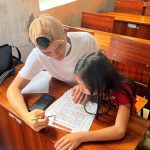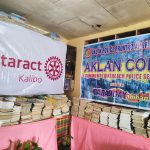“We have a right to an education.”
This is a phrase that we have, perhaps, heard countless times.
But is quality education also a right we are all entitled to? Or is it just a privilege tenable for the few?
September is the month when Rotary International dedicates its monthly theme to Basic Education and Literacy. Hence, on this month’s issue of RAC Matters, we are zeroing in on quality education and how we can work together in making it more of a right, rather than a privilege.
Understanding “Quality Education”
The term “Quality Education” may be too broad to define.
It can have different meanings in different contexts. Several world organizations, like the United Nations and its organs, have defined the term in various ways. But its essential elements are the same everywhere: a well-rounded curriculum, qualified teachers, a supportive learning environment, and adequate resources.
A well-rounded curriculum: A quality education provides students with a broad range of knowledge and skills, including academic subjects, critical thinking skills, and social-emotional learning.
Qualified teachers: Teachers are an essential factor in any educational system. Quality teachers are those who are well-trained, passionate about teaching, and committed to helping their students learn.
A supportive learning environment: Students need to feel safe, respected, and supported to learn effectively. A quality learning environment is one that is conducive to learning and provides students with the resources they need to succeed.
Adequate resources: Quality education requires adequate resources, including textbooks, computers, and other learning materials.
Measuring Up: The Challenges in Achieving Quality Education
In recent years, there have been policies and actions to improve the basic education system in the Philippines. But the issues and concerns that hinders our country’s pursuit to quality education perpetuates.
One of the biggest challenges in the Philippine educational system is the lack of resources. Schools often lack classrooms, textbooks, and other essential teaching and learning materials. This can make it difficult for teachers to provide a quality education to their students.
Another challenge is the shortage of qualified teachers. Our country has a high population, and the demand for teachers is constantly growing, now more than ever. However, there is a shortage of qualified teachers, particularly in science, technology, engineering, and mathematics (STEM) subjects.
Poverty is also a major barrier to education in the Philippines. Many children from poor families are unable to attend school because their families cannot afford the costs of tuition, uniforms, and other school supplies.
Now, what can WE do?
For good reason, the 4th Sustainable Development Goal (SDG) of the UN is not just about education, but quality education. Further, it emphasizes that we are “to ensure inclusive and equitable quality education and promote lifelong learning opportunities for all”.
Pleasant and noble it may sound, but the work before us is daunting and demanding given how challenging the context of our educational system in the Philippines is. Regardless, working on the opportunities to improve our education landscape outweighs the
Nonetheless, it takes a community to provide quality education to every child.
Despite these challenges, there is a growing movement in the Philippines to improve the quality of education for all Filipino children. We, Rotaractors, can play a vital role in this movement by volunteering our time and resources to support schools and teachers.
Quality education shall be a collaborative effort within our respective clubs, between our clubs, and between other interested parties (formerly referred to as “stakeholders”) such as the government, the church, the communities, other civil organizations, etc.
When we collaborate on projects that address the specific challenges associated with education and literacy, both locally and globally, we contribute to the collective pursuit of improving and democratizing the quality of education.
***
Is quality education too much to ask?
Definitely NOT.
As I have stressed out in my previous article here on the Philippine Rotaract Magazine: Pol John’s Grit and Dedication: Project ALIBATA and The Rotaract of Club of Carmen Valley, It is our moral duty to reach out and help our young people keep up with the basic yet essential skills they need in life. A quality education is the best way to ensure that our children have a chance to succeed and build a better future for themselves and for all of us.
Education may not completely guarantee that one would not be a subject to social problems like unemployment and poverty. But it does increase his/her opportunities.
As we hold projects concerning Basic Education and Literacy, may we always put in mind that education is not just about making sure that every child finds a place in the classroom. What they learn there and the environment in which students learn can have a significant impact on their success.
Let our battle cry at the Philippine Rotaract be for quality education for it is everyone’s necessity, not a luxury that shall be enjoyed by the few.




